#if there’s ever a chance for me to reference this movie NAY FILM
Note
about baby deadpools shirt : is it in reference to the 1986 movie about blues music or the roadtrip one with britney spears ? please? the world needs to know?
I mean look in your heart….. you already know the answer
#gayspaceship#ask#not art#it’s Britney you already know#if there’s ever a chance for me to reference this movie NAY FILM#I will
13 notes
·
View notes
Text
Anonymous asked: Have you watched Lupin? What did you think? (And are you a fan of the books or other adaptations of the character?)
The short answer is yes, I have seen Lupin on Netflix. Overall I enjoyed it so long as I suspended my disbelief at certain things.
Unfortunately it took being struck down by Covid and being bedridden for me to actually to binge watch the whole series. So I was behind the curve when my friends, French and those outside of France, started to talk about it around me. I had to beg them not to give away spoilers until I had seen it all.
It did surprise me that it won rave widespread reviews outside France because usually French drama series don’t travel very well outside of France. I’m sure even Netflix had no idea how successful it would be for them. I’m sure being in Covid lockdown had something to do with it. In any case I don’t begrudge its success as it’s well earned.
However I wasn’t too surprised that within France itself the French reviews were decidely mixed and divisive. The critic at Le Point painfully hit the nail on the head when he wrote, “Le plus gros défaut de l'ensemble reste la pauvreté des personnages, tous unidimensionnels, caricaturaux et aussi épais que du papier à cigarette.“ - loosely translated as, ‘the biggest flaw of the whole thing remains the poverty of the characters, all one-dimensional, cartoonish and as thick as cigarette paper’.
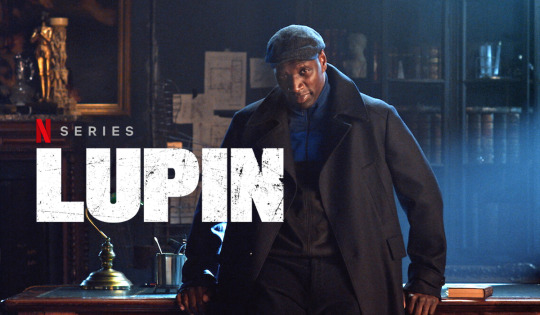
There’s a growing amount of good French stuff on TV and streaming services but a non-French audience will not have had the chance to have seen all of it yet. I can think of any number of French television drama/dramedy/cmedy series that are much better than Lupin with better plots, characters, and even a truer perspective of French society and even modern day France (Dix pour cent (Call My Agent!), Le Bureau des Légendes, Engrenages, Baron Noir, and Paris Police 1900). But you would be hard pressed to find anything that comes close to Lupin just for the sake of something fun to watch during the Covid lockdown.
What makes the current generation of home made French television series so interesting is how much of it is a reflection of France’s own anxieities about itself and its role in a increasingly English speaking dominating world. In a funny way it sees itself as defiant plucky Asterix fighting off the Roman American cultural hordes from totally invading their Francophone culture.
For sure, it has societal and racial issues stemming from its colonial legacy and issues of immigration and integration (France has the largest Muslim population in Europe). However it seems to want to ‘resolve’ these issues through the almost sacramental adherence to French secularist ideals rather than American inspired ideas of social justice and equity. There’s always been something very admirable about the French - from the time of General de Gaulle and perhaps before - always swinging from snooty ambivalence to outright antipathy towards the influence of American culture ‘americanising’ French culture (no to Walmarts or fast food chains for example).
Is it any wonder then that Netflix’s ill-conceived American series ‘Emily in Paris’ was widely hated and mocked within France for just perpetuating those lazy American tropes of Paris and French culture?
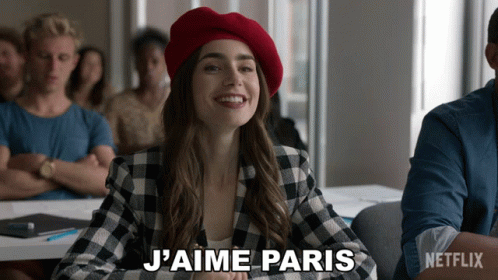
Personally I know Francophile Americans, long resident in Paris, who were frankly embarrassed and spent a lot of time apologising to their French friends. I have one American friend who has told me that she was so mad that she would have blind folded Emily and shoved her hard in the car boot and drive her all the way to the poorest of the banlieues in the grimey crime saturated suburbs of Paris - Seine-Saint-Denis came to mind - and dump her preening arse there. She would slap her and tell the spoilt entitied brat to make her own way back home - you know, to her spacious apartment in one of the most expensive arrondissements of Paris that of course(!) any American intern working for French marketing firms can afford.
I digress. My apologies. Watching this God awful show gives me PTSD.
Onto Lupin.
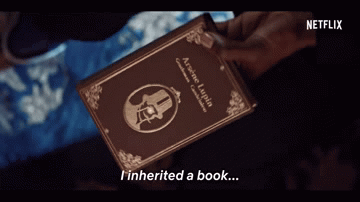
Thankfully Lupin doesn’t try to play to non-French tropes of what Paris is or isn’t. It does skim the surface of current discontents within French culture and society (race, class, power, and money) but ever so lightly so as to not get in the way of just spinning a good crowd pleasing yarn. It invites you to have fun and not to think too much. I have to be honest and say I enjoyed it as long as I suspended my disbelief here and there.
Lupin refers of course to the character Arsène Lupin, the French gentleman thief who stole jewellery from Parisian haute bourgeois and aristocracy at the turn of the century. Lupin, as written in the novels and short stories by Maurice Leblanc between 1905 and his death in 1941, was the archetypical anti-hero, a Robin Hood who stole from those who deserved it but kept the loot himself. He was often portrayed often a force for good, while operating on the wrong side of the law.
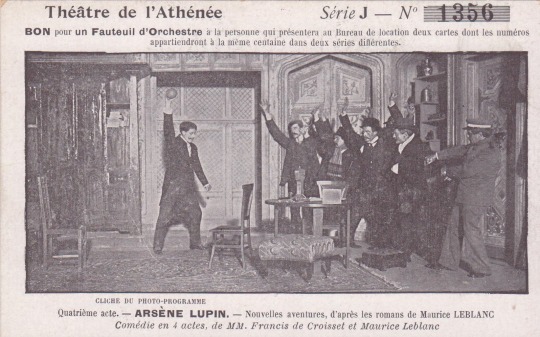
Lupin never really made much of an impact outside of France as he had within France where is revered with many French film and television adaptations. In England, we already had a Lupin type character in the form of A.J. Raffles, a cricket playing gentleman thief with his aristocratic side kick, Bunny. E.W. Horning’s stories of Raffles’ daring heists proved to be quite popular with the British public when Raffles first appeared on the scene in 1898. And even later Leslie Charteris’ The Saint took over the mantle from Raffles as the gentleman thief/adventuring Robin Hood.
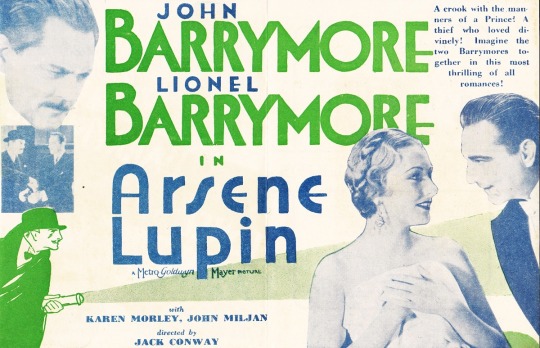
I think Hollywood tried to introduce him to an English speaking audience (legendary actor John Barrymore even played him) but he didn’t really take off and eventually they found their gentleman thief archetype in Sir Charles Lytton aka The Phantom (played by David Niven and Christopher Plummer) in the Pink Panther movies. So Lupin never got the English audience he deserved.
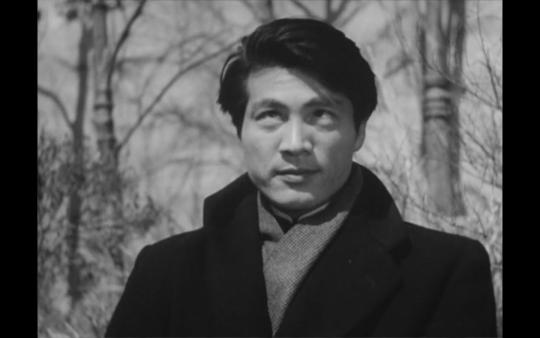
I first got wind of who Arsène Lupin was when I was growing up in Japan as a child. As strange as it sounds Lupin was big in Japan especially after World War Two. The Japanese did their own take on the Lupin character using Japanese actors and plot lines but it was Lupin.
I don’t know how exactly but I remember watching these scratchy DVDs of these Lupin inspired films. I think it was one of my parents’ Japanese friends who was mad for all things Lupin and he had studied French literature in France. Jogging my memory I now recall these black & white films were done in the 1950s. One starred Keiji Sada and the other version I remember was with Eija Okada (he was in Resnais’ classic film, Hiroshima Mon Amour) as Arsene Lupin called (I think) Kao-no Nai Otoko. I didn’t understand most of it at the time because it was all in Japanese and my Japanese (at the time) was pitiful, but it looked fun.
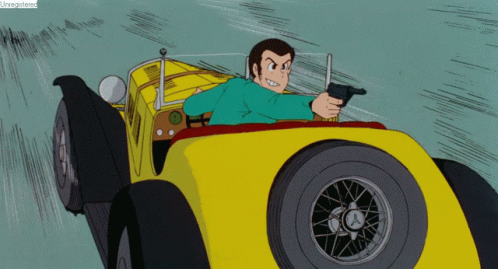
There was even a Japanese manga version of Lupin which was called Lupin III, - so named because he was the grandson of the real Arsène Lupin.
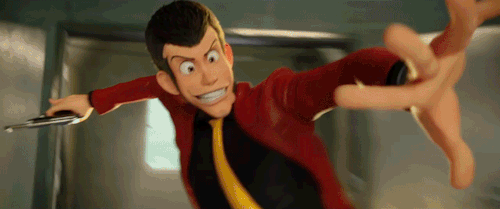
The 1960s manga series spawned generations of TV series which I do remember watching and finding it terribly exciting if somewhat confusing.
It was French expatriate friends whom my family knew that introduced me to the real Arsène Lupin. They had a few of the books authored by Maurice Leblanc. It was in French so I read them to improve my French but enjoyed the story along the way.
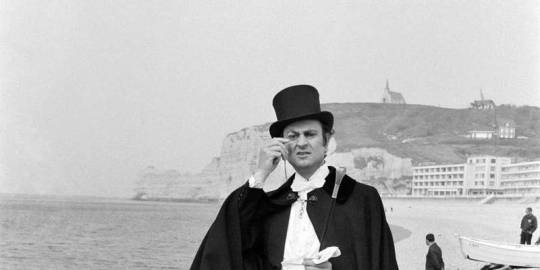
I also remember them showing me scratchy episodes of the 1970s Franco-German TV series ‘Arsène Lupin’ with the monocle wearing Georges Descrières in the lead role. It was a classical re-telling of the adventures of the aristocratic gentleman-burglar and very family friendly viewing. I don’t really remember much of it to be honest.
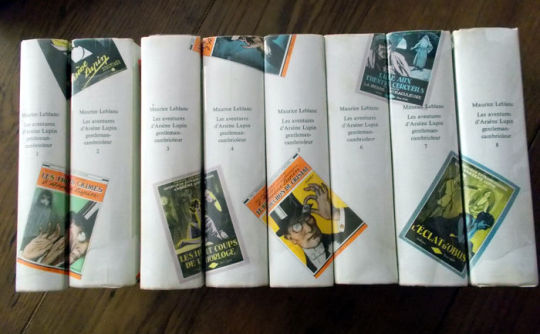
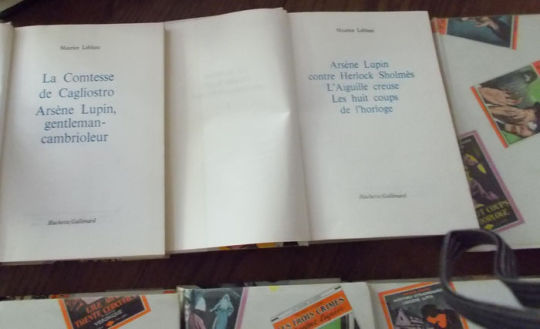
It was some years before I actually started to read more of the Maurice Leblanc’s novels and short stories collection. I have them all now. I was a teen and I remember being stuck in a snowed in a Swiss Alpine chalet and with nothing else to do but pull out a few dog eared books from the bookshelves belonging to our French host and read to pass the time.
I read Les Dents du tigre, Arsène Lupin vs Herlock Sholmes, and Les Huit Coups de l'horloge and thoroughly enjoyed them in the original French. I was already reading classic detective and mystery novels (Sherlock Holmes, Poirot etc) so it was natural to read the adventures of Arsène Lupin.
I haven’t got around to reading all the novels and short stories but I have read most of them and I enjoyed them all immensely. In the same way Conan Doyle, through Holmes and Watson, manages to conjure a convincing picture of late Victorian and early Edwardian England, so Leblanc manages to give us a taste of Belle Epoque France through the eyes of his suave gentleman-thief, Arsène Lupin.
Indeed it's a lot like reading Sherlock Holmes in that you're always trying to figure out how he did it, but the difference is that you are rooting for the bad guy. You can’t help but be drawn to this gentleman thief who is charming, comic, playful, and romantic and generous. Lupin is not an intellectual puzzle-solver but first a master criminal, later a detective helper, who maintains his curious ethics throughout his adventures. In this regard he is very much the anti-Sherlock Holmes; and I wasn’t disappointed when I actually read the story where Lupin faces off with Holmes himself. Brilliant!
I’ve also seen the 2004 French movie with Romain Duris in the Lupin lead role and it also starred the majestic Kristin Scott Thomas and the sexy Eva Green.
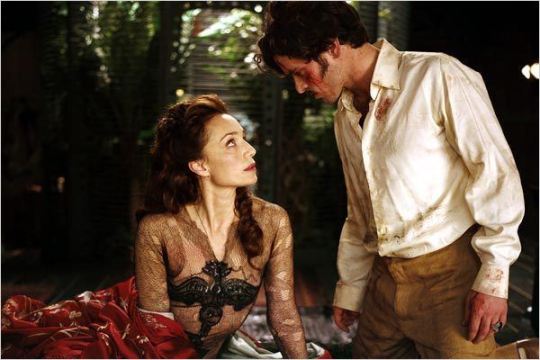
It was a decent adventure flick and it was a clear confluence of different Lupin novels (The Queen's Necklace (introducing Lupin's childhood), The Hollow Needle (where the treasure is the macguffin of the story), The Arrest of Arsène Lupin (the gala on the ship as a backdrop) and Josephine Balsamo, (one of Lupin’s most memorable opponents in the The Countess Of Cagliostro).
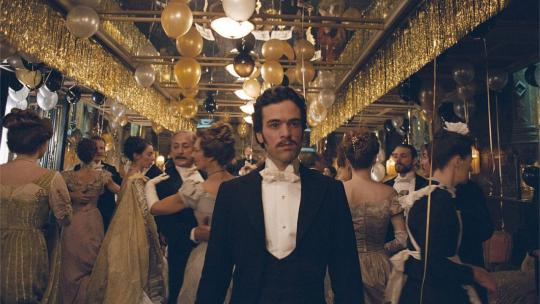
Romaine Duris, a fine classical actor, was I felt miscast because he didn’t have Lupin’s levity of wit and be at ease within himself. I love Duris in his other films but in Arsène Lupin and even in his other film, Moliere, he seemed ill at ease with the role. Perhaps that’s just me.
The latest Netflix adaptation (or reimagining to be more precise) is a welcome addition to the world of Arsène Lupin.If you don’t over-think it, it’s bags of fun.
Omar Sy is immensely likeable. Sy is a deservedly a big star in France - he won the best actor César for “The Intouchables,” an international hit - and has played forgettable secondary characters in big-budget American special effects movies (he was Chris Pratt’s assistant in “Jurassic World” and a minor mutant in “X-Men: Days of Future Past”). It was reportedly his desire to play Arsène Lupin, whom he’s compared to James Bond (“fun, funny, elegant”), that led to the series, created by British writer George Kay. And it is on his charm that the series largely, though not entirely, rests.
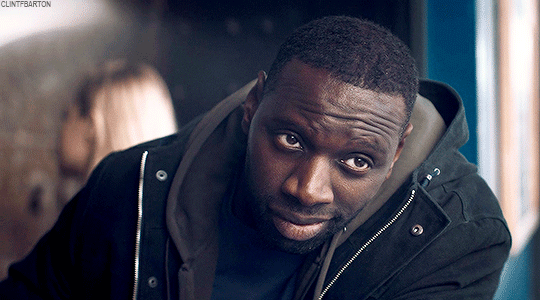
So the basic story revolves around a jewellery heist. Sy plays Assane Diop, a first-generation French-Senegalese man in contemporary Paris. A collection of Lupin stories, a gift from his father - whose undeserved fate Assane set himself to avenge in long-delayed, Count of Monte Cristo style upon a criminal tycoon - has made the actual Lupin books a foundation of his life and profitably illicit career. This fan-ship goes as far as borrowing practical ideas from the stories and constructing aliases out of anagrams of “Arsene Lupin,” a habit that will attract the interest of a low-level police detective (Soufiane Guerrab as Youssef Guedira) who shares Assane’s love of the books. (That the detective also shares an initial with Lupin’s own adversary, Inspector Ganimard, is possibly not a coincidence.)
Among the many comic delights of Lupin, is an unspoken one. Time and again, the show’s hero, master thief Assane Diop is able to slip into a place unnoticed, or by assuming a minor disguise that prevents witnesses from providing an accurate description of him to law enforcement.
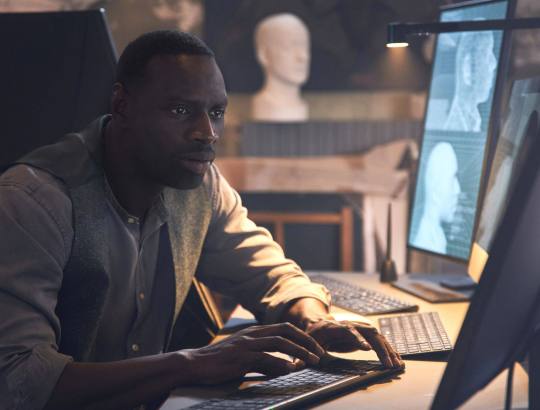
Why is this funny?
Because Omar Sy is six feet three (and, since most actors are short, seems even taller), is roughly as wide as soccer pitch, and is memorable even before he flashes his infectious million-Euro smile. This is not a man for whom anonymity should be possible - even allowing for racial bias in a majority-white country, Assane would be memorable and distinctive - and Lupin seems cheekily aware of this. Like the various incredible sleights of hand Assane deploys to pull off his thefts and escapes, his ability to be anyone, anywhere, is treated more as a superpower than as something even the world’s greatest criminal would be able to pull off.
At one point, when he’s slated for a cable news appearance as a much older man, we learn that Assane is also a master of disguise. The revelation of this skill arrives with a wink in the show, and it feels pointless to ask where he learned it, or how he affords movie-quality latex and makeup. Or rather, asking the question feels wrong.
We know this is impossible, the show seems to be asking its viewers again and again, but isn’t it so much fun?
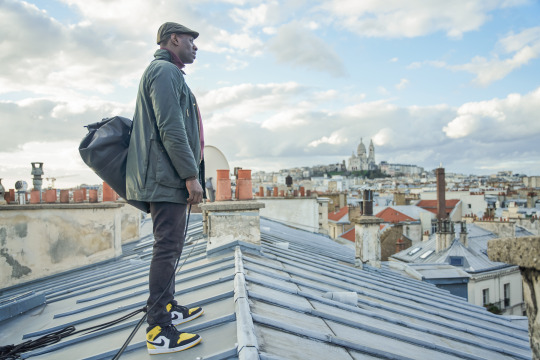
The performances and the production - it has that particularly European filmic quality of feeling natural even when it gets stylish - keep the series warm even as the plot is made up of incredulous contraptions that require everything to go right at just the right time and for human psychology to be 100% predictable. Its physics are classical rather than quantum, one might say, and like the world itself, which becomes more curious the deeper you peer into things, it is best handled along the surface. You do not want to take too much time working out the likelihood of any of this happening. Just go along for the ride.
Somehow, though, it all works because Sy is so magnetic and charming that questioning plot logic feels wildly besides the point. Though he never looks appreciably different in his various aliases (including one ill-conceived live-TV appearance done under old-man makeup and a thick beard), he changes his posture and voice ( if you watch it in French that is) enough to allow for the willing suspension of disbelief, in the same way that any lead actor as Superman has to do when playing Clark Kent. But Sy and the show are at their strongest when Assane is just being his own Superman self, utterly relaxed and confident in his own skin, and so captivating that his ex-partner, Claire, can’t really resist him despite ample reason to.
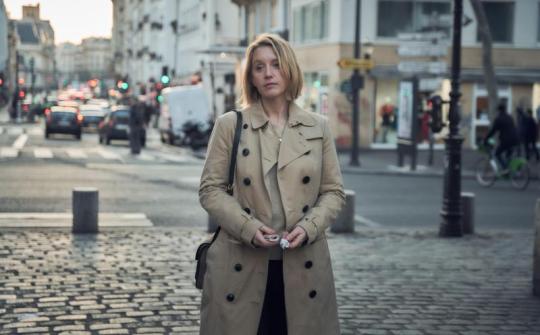
If Assane seems practically perfect in every way, he is not perfectly perfect. His most obvious failing is that his criminal shenanigans and revenging make him less than reliable in his daily life, affecting his relationships with ex-partner Claire (Ludivine Sagnier, whom non-French audiences might recognise from “The Young Pope” and “The New Pope”), who despairs of his inability to show up on time to see his son Raoul (Etan Simon). Like Sy, Sagnier brings a lot of soul to her part - though onscreen far less, she’s as important as Sy to the series’ success - and the two actors have great chemistry. Also impressive and key to creating sympathy are the actors who play their flashback teenage selves, Mamadou Haidara and Ludmilla Makowski. Really, you could do away with action elements and build a series around them.
This is a pity because Lupin often fumbles its emotional reveals in other parts - the story of Diop being torn between his job and his family feels like wheel-spinning, rather than genuine emotional intrigue.
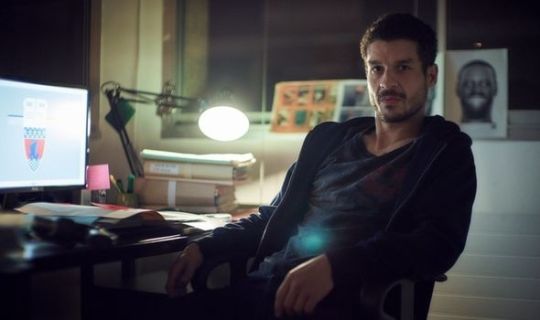
Soufiane Guerrab is wasted in the Young Detective Consumed by the Case role and spends most of this season pinning colour printouts of book covers to cork boards and getting waved off by his colleagues, who are all blinded or otherwise hampered by careerism.
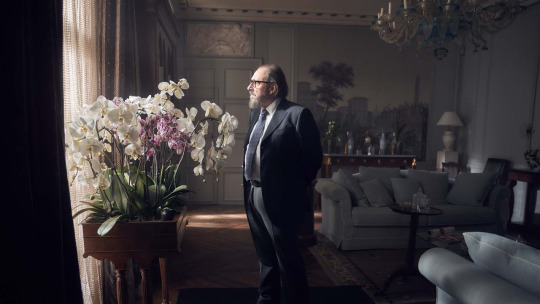
But to my mind the weakest link is the villain himself and his daughter. Veteran actor Hervé Pierre hams it up as Hubert Pellegrini, a business tycoon who is the patriarch of the Pellegrini family. He just comes across as animated cartoon villain with no character depth (think moustache twirling Russian villain, Boris Badenov, in the Rocky & Bullwinkle cartoon shows). He just emotes anger a lot without any nuance or hint of complexity.
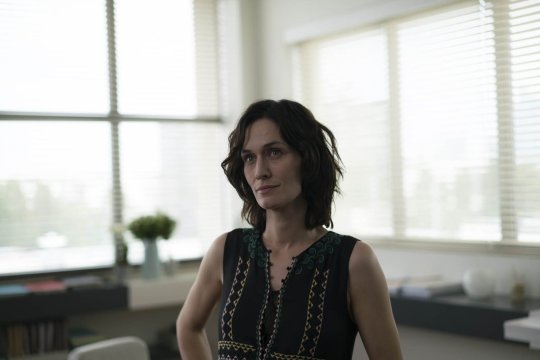
Even Clotilde Hesme who plays the daughter who is unaware of her father’s criminal tendencies is miscast. For the record I adore Clotilde Hesme as she one of France’s most talented classical actresses (that non-French outsiders will not have heard of). She is a classically theatre trained actress and is one of the best stage actresses of her generation that I have ever seen. I’ve seen her in plays where she is just mesmerising. She has said before that she’s more comfortable on the stage than she is on the screen. And when she has been on screen she still has been a powerful presence. She’s actually won a César too. Here in Lupin, she seems to have no agency and looks bored with nothing really to do.I really hope they give her more scenes in the next part of Lupin.
The series is at its best when following Diop enacting his plans, and when revealing each one from a different vantage, making us privy to every moving part like a magician revealing his secrets. The show captures the momentum of a clockwork heist, the tension of sudden obstacles and the ingenuity of improvised responses, with thrilling precision (especially in “Chapter 1 - Le Collier de la reine,” directed by Now You See Me’s Louis Leterrier).
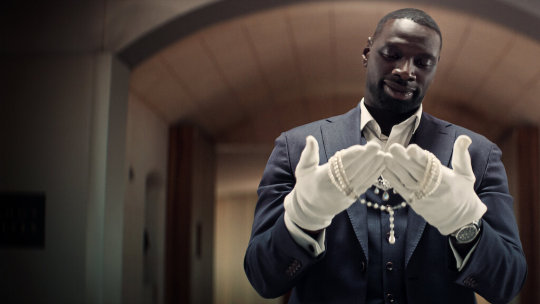
Lupin is also politically incisive when it wants to be; it brings to mind Ladj Ly’s Oscar-nominated 2019 film Les Misérables, which adapted the broad strokes of Victor Hugo’s novel about the 1832 Paris Rebellion, and modernised the story by focusing on the police brutality faced by non-white Parisians.
Lupin opens with Diop disguised as cleaning staff and entering the Louvre after-hours, alongside dozens of forgotten, anonymous non-white workers as they pass by “La Liberté guidant le people,” Eugène Delacroix’s famous painting of the July Revolution of 1830 which replaced France’s hereditary rule with popular sovereignty.
Before any semblance of plot or character, Lupin centres broken ideals and promises unkept (without giving too much away, the show’s primary villain has much more nationalistic view of French culture and history which merely adds to a cartoonish caricature than a complex character). The rest of the episode is about valuable jewels once owned by Marie Antionette - one of the most recognisable symbols of wealth and extravagance in times of extreme poverty - which are put up for auction by the Pelligrini family, and bid on by other wealthy collectors with bottomless purses and no sense of irony.
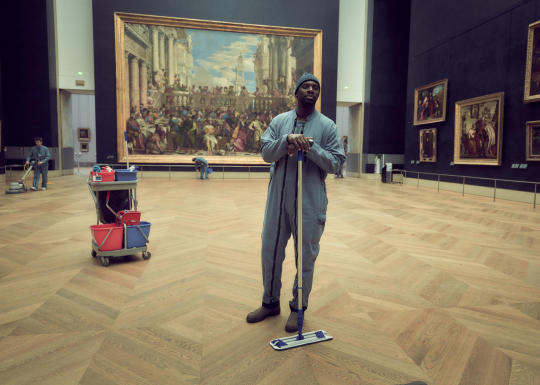
Granted, beyond this auction subplot, explorations of race and class are largely limited to individual interactions, but the show continues to refer back to (and implicitly comment on) its source material in ways that wink at the audience. An elderly, unassuming target of Diop’s schemes seems like an unlikely victim at first - Diop, though he acts in his own self-interest, usually displays a moral compass - until this victim reveals the colonial origins of her wealth, immediately re-contextualising the ethics of the situation, in a manner that Leblanc’s stories did not. (The show is yet to apply this lens to Arsène Lupin himself, who Diop treats with reverence, but that’s a secondary concern since Lupin is entirely fictional in-world).
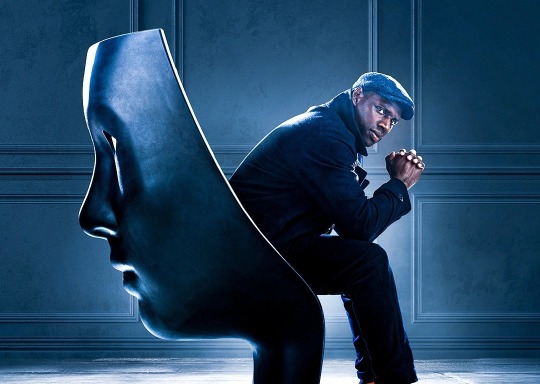
Barring some nagging structural problems - like cutting to flashbacks when things are getting exciting, or epilogues that feel ten minutes too long - Lupin mostly works. It plants a few personal seeds early on, which it keeps hinting at without fully addressing, but by the time its scattered elements come into focus, the show finally figures out how to weave them together, and delivers a mid-season cliffhanger that renders many of these flaws irrelevant.
Lupin manages to have fun even with an antiquated premise - the story of a suave con-man who charms his way through high-profile robberies - while adding just enough new spin on the concept to feel refreshing. Omar Sy may not have much to work with, but his alluring presence makes Assane Diop feel like a worthy successor to Arsène Lupin.
Lupin isn’t going to win César, BAFTA, or Emmy awards, or even turn heads for its ability to develop tertiary or even secondary plots or characters - that doesn’t really matter. You’re there to see a difficult hero be difficult and heroic - everyone else is there to be charmed, vexed, or eluded by them. Sy’s performance bounds off the screen, and is almost musical. He floats through scenes like he glides over the roofs and through the back alleys of Paris; he outmanoeuvres his foes with superior literary references and sheer athleticism. He is irresistible and also good at everything he tries, even kidnapping.
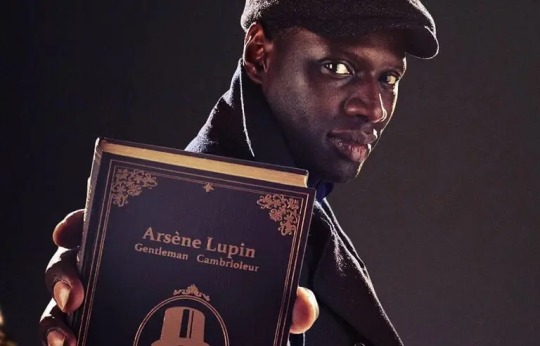
I would encourage anyone to watch Lupin for a fun care free ride. But the only caveat I would make is watch it in the original French.
If you don’t know French then put on the subtitles to understand (that’s what they are there for). The real crime is to watch this (or any film or television series) dubbed in a foreign language. It’s disrespectful to the actors and film makers and it’s silly because it’s comical to watch something dubbed over.
Please watch it in the original French.
Then go and read the books. You won’t regret it.
Thanks for your question.
#question#ask#lupin#omar sy#netflix#tv show#culture#personal#arsene lupin#japan#maurice leblanc#france#french#society#arts
48 notes
·
View notes
Photo
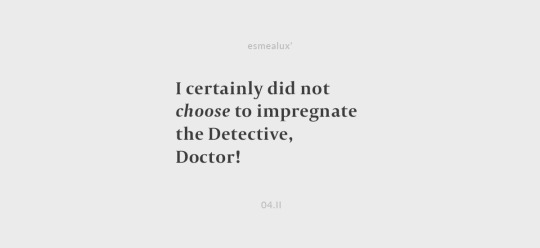
The Devil Doesn’t Do Children
Part: 2 / ?
Setting: About a year after 5a
Word count: 3.5K
Rating: T
Summary: ‘I certainly did not choose to impregnate the Detective, Doctor!’ In which Lucifer doesn’t know how to cope and goes to see the one person who might be able to help him.
Warnings: Mention of death, murder (and, quite indirectly, foeticide)
When Chloe parks the car a little outside the film set, Lucifer has finally got his thoughts and the threatening sensation in his chest under control. He had stared silently out of the window the entire ride, calculating, weighing the different possibilities; which one was more likely—him impregnating her after being sterile since the dawn of time, or her getting food poisoning from a hole in the wall filthier than medieval England? The latter. Definitely the latter. It is the only logical—nay, possible explanation. He has no doubt.
But then she asks him to get her a gum from her glove box (she still has a bad taste in her mouth), and when he looks inside the small space to find the pack she always keeps there, something catches his eye, something pink and flat, something he usually associates with mood swings and five days of limited access—something that reminds him she’s more than a week late.
He grabs the gum between his fingers and hands it to her, smacking the glove box shut as if it will erase what he just saw and the distressing epiphany it led to. He searches for alternate explanations in his panicking mind, something, anything, that will ease his returned and now stronger fear that she’s… That they’re… But he comes up with nothing. Just obscure theories that even he will admit are far-fetched.
He doesn’t say anything—not because he knows she doesn’t want to have the conversation on their way to talk to a potential suspect, but because he can’t. So he just follows after her like a lost puppy, until they’re suddenly sitting in a cramped trailer, facing former child-star, current man-child Max Steinfeld.
‘Why did you walk away when we asked you about Laura?’ Chloe asks the actor. He had fled? Lucifer hadn’t noticed. Then again, he’s not entirely sure he would have remembered if they’d been in a car chase, or a gunfire.
The sad example of a man slides a tabloid towards them in response to the Detective’s question. The front page shows a picture (undoubtedly shot by a paparazzo) of him and Riley walking down the street hand in hand, smiles plastered on their polished Hollywood faces. Next to the headline promising insight in ‘all the details about the magical wedding,’ there’s a close-up of an offensively distasteful diamond ring.
Lucifer sees a chance at escaping the cacophony of disturbing thoughts in his head and takes it. ‘What, because you’re marrying Miss Riley and didn’t want a murder case spoiling your-’ he takes the magazine and swiftly flips through the pages till he finds the right one, ‘uber-romantic seaside wedding? Is that it?’ Lucifer leans a little forward and stares intensely into the man’s eyes, his best cheshire grin playing on his lips. ‘Come now, Maximillian, what is it you truly desire?’
‘I…,’ he begins, not blinking as he’s sucked into Lucifer’s stare, ‘I want to stop pretending.’
‘Pretending that you didn’t kill an innocent woman because you put a bun in her oven?’
Steinfeld’s brows draw together in confusion before they arch up in worry and disbelief. ‘Laura’s… dead?’
Lucifer’s just about to call him out on his charades, when the Detective jumps in and confirms that she was found in her home, stabbed to death.
Max’ face turns white. His jaw goes slack. Then a cry of raw agony fills the confined space.
*
Once Steinfeld has calmed down enough to continue the conversation, Chloe decides to go easy on him and begins by asking him where he was between 9 and 10 PM last night.
‘With Moni,’ he says, looking almost ashamed. ‘I had a date with Laura—we were gonna see each other for the first time in weeks—but she didn’t turn up. I figured she was still mad.’
‘Mad?’ Chloe prompts him to elaborate.
‘Yeah, well, I didn’t exactly handle the whole pregnancy-thing very well. I couldn’t- I just- I panicked.’
‘So you killed her,’ her partner concludes beside her. She gives him a stern look and a reprimanding ‘Lucifer.’ He ignores her.
‘No! I would never hurt her! I love her,’ Steinfeld tells them, all kinds of emotions swimming in his eyes. ‘But when she told me, I just couldn’t… deal with it, so I ignored her, for five weeks. One thing was trying to wrap my head around the fact that I’m-’—he gulps and takes a deep breath—‘was gonna be a dad, but I also had no idea how I was gonna tell them.’
Chloe is just about to ask who he means by ‘them’ when Lucifer opens his mouth. ‘Oh, I’m sorry, my mistake. I’ll refer to them as Mx Riley from now on.’ He sounds genuinely apologetical. Chloe side-eyes him, confused.
‘What? No,’—Steinfeld shakes his head—‘Moni goes by “she”. I meant the studio. They made us sign a contract at the beginning of production in which we agreed to pretend to be a couple in public to-’
‘Build hype around the movie, sell more tickets and boost your personal career?’ Chloe finishes. She’s familiar with the concept.
‘Yeah, something like that,’ Steinfeld mutters and rubs his brow, his hand still visibly shaking from the shock. ‘But I was growing tired of it. I like Moni, she’s one of my best friends, but nothing more than that, and what I had with Laura was so… real. It was all pretty new, but she made me happy. I wanted her in my life—to share my life with her. Still, I was nowhere near ready to have a baby with her, to become a dad! I mean, I still have a bad reputation in the business, I’ve spent all my savings on drugs and alcohol and a mansion I can’t afford, and sometimes I get so stressed I don’t eat for days. How am I supposed to take care of a kid?’ His voice is laced with frustration and tears stream down his stubbled cheeks. She expects Lucifer to scoff at the ‘dramatics’, or at least show some kind of disapproval of the emotional display, but he doesn’t.
‘Look, I get it,’ Chloe says, laying her arms on the table. ‘When I was pregnant, me and my ex-husband were absolutely terrified too.’
She senses Lucifer looking at her out of the corner of his eye. She’s not sure why, or what it means, so she ignores him and continues.
‘Is that why you did it? Did you go to her place when she didn’t show up for your date and then when she brought up the baby you lost your temper? You got scared?’ She wills her voice to be calm, knowing the man is vulnerable.
Max frantically shakes his head. ‘No! No, more the opposite! I was gonna tell her that I loved her and that I was gonna try. That’s why I went to Simone’s when she didn’t show up. Moni knew about Laura, what she meant to me, so I went to her to talk about how we could escape this fucked-up PR stunt controlling our lives,’ he points angrily to the smiling picture of him and Riley on the cover of the tabloid, still on the table. When he continues, his voice is calmer, but also more emotional, ‘so we could be free, and I could do right by Laura… and our baby.’
Chloe turns to look at Lucifer—to see if he, too, believes Steinfeld is innocent—only to discover that her partner is glowering at the now frightened man across from them. Lucifer is breathing heavily, his fist clenched between them, his knuckles white. His voice is sharp and venomous when he speaks, almost hisses, ‘How exactly were you gonna do right by them? How could you just accept that you were gonna be a… a father, even when you knew, in every cell of your damned body, that you couldn’t?’
He’s standing now, his tall frame shaking, heat rolling off him. She reaches for his hand to calm him down (Steinfeld has faced enough trauma today as it is), but he quickly draws it back, as if he’s burnt by her touch. His eyes remain brown and his face smooth and tan, anthropomorphic—still, a lump settles in her throat. Before she can say anything, he speaks again, his voice lower now, only a few octaves from demonic and flaming with something she can only describe as wrath. Wrath and pain. ‘How could you ever pretend to love something you never wanted?’
He storms out of the trailer, surprisingly elegantly considering his emotional state. She excuses herself to Steinfeld and rushes out to talk to her partner, comfort him, ask him what the Hell is going on.
But he’s gone.
Vanished.
Sighing, she bends down to pick up a large, silky feather from the ground.
*
The door bursts open, the hinges shrieking in protest as it slams against the wall and knocks down a picture frame in the process. Linda takes a deep breath and slowly turns around to face her intruder. ‘Lucifer, what have I told you about barging-’
The words get stuck in her throat when she sees him. His hair is dishevelled, his clothes wrinkled and disarranged. A dash of colour is missing where a pocket square usually sits and completes his outfit—whether he lost it without noticing or he didn’t pick one out in the first place, she can’t tell, but either way, it’s concerning. Even more so when combined with his face. Oh God, his face. He looks pale, too pale—ghostlike. His pupils are mere specks, his eyes manic. His chest heaves rapidly as he takes in short, ragged breaths.
Last time she saw Lucifer in a state similarly chaotic, dark, leathery wings were sticking out of his back. Before she can ask him what’s wrong, his tremulous voice fills her office.
‘The Detective’s pregnant.’
Not what she’d expected, but his reaction seems about right.
She goes to his side to help him sit down on the couch, pours him a glass of water, and doesn’t sit down till she’s made sure he’s drunk some. Once in her chair, she takes a deep breath, partly to prepare herself for the incoming conversation and partly to make Lucifer mirror her so they can get some oxygen to his head. She’s not sure if angels can pass out, but she’s not gonna take the risk.
‘Okay,’ she says calmly, ‘and how do you feel about it?’ The question sounds kind of absurd as he’s sitting there, practically radiating distress. Nevertheless, he needs to put his feelings into words.
‘How do you think I feel about it, Doctor?’ he growls.
She doesn’t answer that. Instead, she looks at him with a slight smile and raised eyebrows, inviting him to tell her.
‘I feel betrayed, for one,’ he spits, feeding her plant with the sparkling water she’s provided him—before emptying his flask into the glass and taking a large gulp.
‘By whom?’ she asks.
He glares at her and takes another sip. ‘My father, obviously.’
Linda suppresses a sigh of frustration. She’d thought God coming to Earth and their subsequent bonding time had finally made Lucifer bury his manipulative daddy issues. Guess she was wrong. ‘What do you think your father has to do with Chloe getting pregnant?’ She doesn’t miss how he winces at the last three words before his face sets into taut lines.
‘Oh, I don’t know, Doctor.’ His voice is thick with sarcasm. ‘I mean, it’s not like he has ever sent down one of his pathetic thralls to “bless” a barren couple with a spawn.’
‘How are you so sure you’re infertile?’ she asks him with narrowed eyes, leaning back in her chair. They’d thought Amenadiel was infertile, but she has 31 pounds of pure joy at home to disprove that.
‘Well, it’s simple maths,’ he replies. She gives him a curious and mildly sceptical look, and he leans forward, putting his now half-empty glass down on the table. ‘Right, I’ve been practicing safe sex since the first ever condom came about—you know, for the sake of my lovers’ health—but condoms are only 98% effective at preventing conception, and the ancient prototypes were much worse, which means that, had I not been sterile, I would have fathered one hundred thousand children, give or take, throughout history, and I haven’t. I would have noticed; they would have flocked around me like little rats to get a piece of my fortune every time I appeared on Earth. Ergo, infertile.” He gestures towards his crotch with a dead-serious expression.
‘Right,’ she says, forcing herself to look at his face. ‘And what makes you think that that trait, or whatever you wanna call it-’
‘I call it a blessing,’ he interrupts her, the slightest glint in his eye as he peers at her from over the brim of the drinking glass.
‘What makes you think it’s everlasting?’ she asks him, a theory suddenly forming in her mind.
He furrows his brow. ‘Beg your pardon?’
‘Well, you’re not completely immortal anymore,’ she reminds him, her eyes shifting to his thigh where his first (not self-induced) scar is covered by his creased suit pants. He sends her a hurt look. ‘What a positively shitty way of trying to cheer me up,’ he huffs before downing the remaining liquor.
‘What I mean is,’ she begins to clarify, ‘what if your infertility is like your immortality?’ She lets the words sink in before she continues, ‘What if your aversion to having children, to becoming a dad, has affected your ability to physically father a child? But just like you chose to be vulnerable around Chloe, you’re now choosing to have a baby with her, to grow your family.’
He scoffs, almost laughs, but there’s no trace of humour in it. Only torment. ‘I certainly did not choose to impregnate the Detective, Doctor!’
‘Maybe not on a conscious level,’ she argues. ‘But maybe after the personal development you’ve been through, after seeing you’re worthy of being loved, not just by Chloe but also by Trixie, you’re finally realising, somewhere deep inside, that you’re also worthy of being someone’s dad.’
‘That is…’ he whispers, gazing out into empty air with a thoughtful expression, only to ultimately conclude, ‘absolutely preposterous!’ He sends her a dirty look, as if he’s accusing her of humbug. ‘I don’t want to be someone’s dad, Doctor—I don’t want a baby! The Devil doesn’t do children. I despise them. Always have. You know that.’
‘That doesn’t mean you always will. I mean, do you despise Charlie?’ She waits a couple of beats, watching him intently. ‘Do you despise Trixie?’ She nods in the direction of his chest, knowing his phone is in his breast pocket, nestled against his heart, the screen lighting up with a picture of himself and his two favourite girls every time he gets a notification.
‘Your son appreciates my devil face,’ he defends, ‘and the Detective and her offspring are a package deal.’ Linda knows he tries to appear indifferent, but he can’t hide the fondness suddenly twinkling in his eyes. If Linda wasn’t sure before, she’s now absolutely positive that Lucifer loves Trixie nearly as much as he loves her mother. She sees it all the time; it’s in the way his eyes flash red with hellfire when Trixie is hurt or sad; it’s in the way his chest puffs out with pride whenever he talks about her; it’s in his jealous stare when she and Dan laugh at an inside joke; it’s in his jubilant eyes when he’s the one who makes her laugh; it’s in the immense effort he constantly makes to always be there for her, to never disappoint her.
‘You might call them a package deal, Lucifer,’ she says softly, making him look at her, ‘but they call you family.’
He’s snatched the empty glass from the table and is now nursing it in his hand, unintentionally mimicking his nephew with his security blanket. His eyes are downcast, but she can tell his heart swells at the mention of the F-word. He’d dropped by her place about a month ago, shock all over his face. ‘The urchin referred to me as her family,’ he’d said. Linda had smiled and replied with a simple ‘Of course she did’. As narcissistic and self-indulgent as he is, he is surprisingly oblivious to other people’s affection for him. Then again, what else could you expect from a person who was abandoned by his parents, literally pushed into the abyss, and for eons deprived of any kind of love?
With Lucifer’s background in mind, Linda steers the conversation back to his feelings about Chloe being pregnant. ‘If you’re being completely honest with yourself, Lucifer,’—she stares at him until he lifts his head and looks her in the eyes—‘what do you think is the main reason you’re having this reaction to Chloe being pregnant? Is it because you don’t want children?’ She lets him think for a couple of seconds before adding, ‘Or is it because you’re afraid you’ll let your child down like your dad let you down?’
Sadness flashes across his still ashen face before the muscle in his jaw flexes and hot fury fills up his eyes. ‘My father didn’t let me down,’ he snarls, putting the glass down with an alarming clank, ‘He banished me from my home and sent me to Hell—after my mother wouldn’t let him kill me! No words cover that immense extent of neglect, Doctor. That cosmic measure of betrayal!’ His voice is shrill and rough as he shouts the last word, accompanied by the jarring sound of the drinking glass shattering to a million pieces as it collides with the wall behind her.
Lucifer takes a few heavy breaths and, once he’s gotten his anger somewhat under control, pointlessly adjusts his jacket and straightens his spine. ‘No one should have to endure even a fraction of that,’ he tells her, appearing strangely remorseful. ‘Especially not an innocent child.’
And there it is.
‘You are not your dad, Lucifer,’ she reminds him. ‘Or your mom. You’re not gonna abandon your child. You’re not gonna hurt them.’ She waits till he looks up at her (his brown eyes are so sad it makes her chest ache) before she says, ‘You’re gonna love them with every piece of your heart and go to the ends of the earth, or Hell, to protect them, because that is who you are. Maybe you weren’t that person when you cut your wings off on the beach eleven years ago, and maybe not even when you first started assisting the LAPD. But that’s who you are now. Just ask Chloe and Trixie.’ She would add all the other people around him who know this to be true, who know him, but there are only two people whose opinions matter to him in this case.
He doesn’t answer. His lips part, a smidgen of hope and belief appearing in the sea of fear in his eyes.
‘You referred to it as a “blessing” before, the fact that you couldn’t have children.’ He grimaces at the past tense. ‘Based on that, I assume you think having a child would be a curse?’
He raises an eyebrow, questioning her intelligence.
‘Right. But why do you think that is? I mean, if you think about it, is it really so bad that you and Chloe are having a baby? Someone who’s a beautiful mix of the two you, created out of your love for each other?’
He stops tending an invisible spot on her couch to look up at her. Colour has returned to his face, and the anger from before is gone; only a crease of worry remains. He looks tentative, but not scared to his core like earlier, his gaze warm and soft.
‘I…’ he says, musing. After a few seconds of silence, he answers, ‘To be frank, Doctor, I don’t know.’ His lips settle into a crooked line, stuck between a smile and a frown.
Linda lifts a friendly brow, her own lips tugging up at the corners. ‘Can’t know till you try, right?’
‘Right,’ he admits. It’s still not exactly a smile she sees on his face, but it’s close enough.
‘Have you talked to Chloe about all this?’ she asks him.
‘I haven’t, no. Do you think I should?’
Linda blinks, a little dumbfounded he’s even considering it an option not to talk about his fears with the woman who’s carrying his baby.
‘I’m joking,’ he says then, the smallest of smirks playing on his lips. ‘Of course I’m gonna talk to her! I just thought it best to, you know, sort out my own thoughts on the matter first.’
‘Oh,’ she mutters, realising she might not give him enough credit. He really has come a long way since their first session. ‘That’s very mature of you, Lucifer,’ she praises him.
The minuscule smirk from before spreads out into his cheshire grin. ‘What can I say? All good people know everything below an M-rating is boring and worthless.’
He smooths his pants over his thighs and checks his cuffs before standing and walking to the door. Just before he leaves, he turns to her with newfound courage in his eyes and says, ‘Now, if you’ll excuse me, there’s a detective I need to have a chat with.’
Part I | Part III | Part IV (coming soon)
#deckerstar fanfiction#writing#The Devil Doesn't Do Children#lucifer x chloe#lucifer morningstar#chloe decker#dr linda martin#lucifer goes to therapy#hurt comfort#pregnancy#murder case#trixie espinoza#post 5a#established#angst#deckerstar#lucifer on netflix#lucifer fanfiction
23 notes
·
View notes
Text
And Now, THE Greatest Lawyer Movie of All Time
Settle in.
When I set out on this project almost a year ago, I had many questions: What are the greatest lawyer movies ever? What makes a great lawyer movie great? And how long would Blueprint actually let me keep this up?
Since then, I’ve watched 24 lawyer movies, most of them from the ABA’s Top 25 list. Below, I have attempted to summarize my findings and reflections. I hope they serve as a basis for further research in the burgeoning field of lawyer movie scholarship.
Movies Reviewed
12 Angry Men
And Justice for All
The Paper Chase
Compulsion
Inherit the Wind
Reversal of Fortune
The Lincoln Lawyer
Anatomy of a Murder
A Civil Action
A Time to Kill
My Cousin Vinny
Denial
The Verdict
Presumed Innocent
Judgment at Nuremberg
In the Name of the Father
Philadelphia
Miracle on 34th Street
A Few Good Men
To Kill A Mockingbird
Erin Brockovich
Kramer vs. Kramer
Amistad
Breaker Morant
The 10 Greatest Lawyer Movies of All Time
10) Anatomy of a Murder – “Anatomy of a Murder” might be the definitive courtroom procedural. It’s recreates a case with little social or judicial significance, no clear good guys or bad guys, and not much in the way of personal stakes. But a murder trial is inherently compelling, and by sticking to the facts, director Otto Preminger achieves an unusual level of authenticity. The movie revels in ambiguities: in the interpretation of evidence, in the definition of responsibility, and in the moral obligations of a criminal defender whose client is probably guilty. [Review]
9) Breaker Morant – Despite its historical inaccuracies and one-sided take on the prosecution of war crimes, there’s no denying the effectiveness of “Breaker Morant” as a legal drama and political myth. It tells the story of three Australians in the Queen’s army on trial for killing civilians during the Second Boer War. It’s easy to judge these soldiers from the safe confines of a courtroom, but the reality of war is messy. Sometimes, legal responsibility doesn’t have much to do with moral responsibility: the tribunal punishes those at the bottom of the hierarchy, who had the least freedom over their actions, and gives cover to the decision-makers at the top. [Review]
8) Philadelphia – Tom Hanks and Denzel Washington lead this legal drama about a gay lawyer with AIDS who sues his former employer, a prestigious Philadelphia law firm, for wrongful termination following the revelation of his diagnosis. The movie is a shameless tearjerker, but there’s much to admire about its spirit. It holds up the courts as a place where citizens can go to appeal to the better angels of our nature and ask that their humanity be recognized. [Review]
7) The Verdict – “The Verdict” is the archetypal lawyer redemption story. An alcoholic ambulance chaser has a case fall on his lap that reminds him what lawyers at their best can do: fight to give people half a chance at justice, at least some of the time. Paul Newman’s famous closing statement exemplifies the movie as a whole: it’s unflashy, sincere, pleading. [Review]
6) The Paper Chase – Prospective 1Ls be warned: law school is apparently very hard. Maybe there should be more law school-set psychodramas, because it turns out to be surprisingly satisfying to watch students in “The Paper Chase” cower before Professor Kingsman, a notorious Contracts teacher and terrifying executor of the Socratic Method. His questioning is as dramatic as any line of cross examination. [Review]
5) A Civil Action – The true-story case at the center of “A Civil Action” is a remarkable one: in the mid-1980s, a hot-shot personal injury lawyer proved that a leukemia cluster in a small Massachusetts town had been caused by illegal chemical dumping, and he went bankrupt in the process. “A Civil Action” is a rousing legal drama that gives a fascinating look at the high-stakes poker game of civil litigation. [Review]
4) In the Name of the Father – In theory, the courtroom is a place where citizens meet as equals and reason and the truth win out. In practice, it’s a place where the concentrated power of the state can come crashing down on your head, universal rights of man be damned. The trial in “In the Name of the Father” is not a forum for weighing evidence – there isn’t any evidence. It’s political theater, a scapegoating ritual meant to comfort one population with the illusion of security and terrorize another with a display of arbitrary cruelty. Starring Daniel Day Lewis and Pete Postlethwaite, it is a powerful, tragic film. [Review]
3) Judgment at Nuremberg – Stanley Kramer’s film is a fictionalized retelling of the “Judge’s Trial,” in which a group of German judges were tried for colluding with the Third Reich. While many lawyer movies explore the themes of judgment and guilt, none does so with more depth and seriousness than “Judgment at Nuremberg.” It’s a film that turns our judgment inward, asking us to take a hard look at our own capacity for good and evil and the moral standards to which we hold ourselves. It shows the legal system attempting to do the same: as judges are brought before the court for judgment, the system itself is put on trial, and its relationship to justice is questioned in the wake of unconscionable crimes. [Review]
2) 12 Angry Men – While most lawyer movies focus on the dramatics of trial, “12 Angry Men” goes where the real action is – the jury room – and explores epistemological questions at the heart of our legal system: What can we really know? What constitutes a “reasonable doubt” when a person’s life is on the line? Uncertainty can be maddening, and the tension in the room builds over the course of the movie’s runtime to become almost unbearable. And yet, there’s nothing particularly remarkable about the case; it’s one story out of a thousand on a hot New York day. [Review]
1) My Cousin Vinny – I could have saved myself a lot of time and declared this the winner at the outset, but I had to do my due diligence. In the end, it just wasn’t possible to top “My Cousin Vinny,” which is not only a perfect movie, but also a quintessential lawyer movie. Joe Pesci stars as Vinny Gambino (aka Jerry Callo), a New York lawyer trying his first case – a capital murder trial – in the deep south. The movie offers a unique and hilarious perspective on lawyering as the art of quibbling. [Review]
Honorable Mentions
To Kill A Mockingbird
Erin Brockovich
Kramer vs. Kramer
Amistad
Notable Lawyer Movies Not Reviewed
What can I say? There are a lot of lawyer movies, and I’m just one man. I didn’t get a chance to watch every viable contender. Here are a some notable lawyer movies that were not considered:
The Accused
Adam’s Rib
A Man for All Seasons
The Caine Mutiny
Chicago
Class Action
Conviction
The Crucible
A Cry in the Dark
The Devil’s Advocate
Devil’s Knot
The Firm
Fracture
Ghosts of Mississippi
The Hurricane
In Cold Blood
The Insider
Intolerable Cruelty
Jagged Edge
JFK
The Judge
Legally Blonde (my bad)
Liar Liar
Michael Clayton
North Country
The Paradine Case
Paths of Glory
The Pelican Brief
The People vs. Larry Flynt
Primal Fear
Rashomon
The Rainmaker
Runaway Jury
The Social Network
Stir Crazy
The Young Philadelphians
Witness for the Prosecution
Young Mr. Lincoln
For more breakdowns of the best of the field, check out the fine lists put together by Above the Law, Inside Counsel, and the American Film Institute.
Conclusions
The purpose of this project – nay, journey – has been not only to identify the greatest lawyer movies of all time, but also to better understand what makes lawyer movies distinct and valuable. Below are common themes and tropes I noticed, along with some personal reflections.
Common Themes
Legal Justice v. Moral Justice: Even on its best day, the legal system is just an approximation of justice; there’s an inherent gap between what’s right and what’s legal. Lawyer movies like “…And Justice for All,” “A Time to Kill,” and “Amistad” are all about this gap. The tension between intuitive, emotional morality and the big-picture, impersonal rule of law is perhaps the most common and unifying theme of the subgenre.
David v. Goliath (aka Justice is blind): Equality before the law is an ideal enshrined in the 14th Amendment and further sanctified in Hollywood Court, where the law is so powerful a tool that it can be used by the powerless to bring down tyrants and unravel maleficent conspiracies. Hence the abundance of lawyer movies about a little guy daring to take a giant to trial. See, e.g.: “Erin Brockovich,” “Philadelphia.”
Judgment: The essence of a trial is judgment. So lawyer movies naturally raise a lot of complex questions about responsibility, complicity, and innocence. What should we make of the ugly things that we humans do? Should we forgive each other, and by extension, ourselves? Or should we demand better, and hold in righteous contempt anyone who betrays the our shared principles? Movies like “Compulsion,” “Judgment at Nuremberg,” and “A Few Good Men” offer tentative answers.
Redemption: In movies about the day-to-day grind of being a lawyer, the theme of moral redemption is prevalent (although you could probably say the same of Hollywood films in general). Lawyers can represent our loftiest ideals, but they can also be money-hungry bullshit artists. A profession that spans such a moral range is perfect for stories of rebirth (see “A Civil Action,” “The Verdict”). Thus the lawyer movie myth of the down-and-out advocate who gets One Good Case and finally has a chance to do something that matters.
Common Tropes
In my reviews, I’ve often referred to the website tvtropes.com, a wikipedia of the formulas and cliches found in literature, TV, and film. It’s an amazing rabbit hole of a resource, and it helped me identify the following as common tropes associated with the lawyer movie subgenre:
The Ace
The Ambulance Chaser
Amoral Attorney
Armor-Piercing Question
Army of Lawyers
Asshole Victim
Break Them by Talking
Common Nonsense Jury
Conviction by Contradiction
Courtroom Antic
Crusading Lawyer
David vs. Goliath
Disregard that Statement
Good Lawyers, Good Clients
Grey and Gray Morality
Ham to Ham Combat
Hello, Attorney!
Hollywood Law
Insanity Defense
The Judge
Kangaroo Court
The Killer Was Left-Handed
Miscarriage of Justice
Mistaken Confession
Omnidisciplinary Lawyer
Penultimate Outburst
The Perry Mason Method
Redemption Quest
Rogue Juror
Simple Country Lawyer
Stock Legal Phrases
Surprise Witness
That Was Objectionable
For more lawyer movie tropes, check out The Courtroom Index and the entries on Artistic License – Law and the Law Procedural. [Warning, this website is very addictive.]
Personal Reflections
A trial is a natural subject for film. This is somewhat obvious, but watching 24 lawyer movies really drove home for me how much sense the courtroom makes as a setting for a movie. I can think of three main reasons.
One, trials are naturally theatrical. They’re showcases staged for the jury; contests with clear-cut adversaries, rules, and stakes; operations with built-in beginnings, middles, and ends.
Two, trials are both intensely personal (lives are at stake) and highly impersonal (precedents and principles are also at stake). The best drama tends to be similarly split. It’s both specific and universal, telling stories rooted in people’s individuality but connecting to some bigger picture. Most court cases that become lawyer movies have this dynamic built in.
Three, the law intersects with various other subjects that make for great screenplays: government and politics, crime and violence, police investigations, the prison system, and the fog of war, to name a few.
Which is all to say: it’s no wonder that people are still telling legal stories 2,500 years after Aeschylus invented the genre with “The Eumenides.”
Movies are a great and terrible way to learn about the law. A number of movies I watched opened my eyes to aspects of the legal system that I was unfamiliar with. And since the law affects each of us so profoundly, there’s a ton of value to movies that inform mass audiences about how the system works. “Anatomy of a Murder” and “A Civil Action” are good examples of lawyer movies that are both accurate and insightful. On the other hand, too many lawyer movies are set in the world of Hollywood Law. They distort and glamorize the practice of law and contribute to our collective ignorance. A little embellishment is understandable – real lawyering can be pretty boring, I hear – but it’s a problem when lawyer movies perpetuate gross misconceptions. Take, for example, the “CSI Effect“: some argue that jurors have started having unrealistic expectations about forensic evidence thanks to the lawyer movies and TV they watch, and this might be improperly influencing their willingness to convict.
A lot of lawyer movies age badly. I found a surprising number of movies to be uncomfortably dated, especially with respect to gender and race. Movies like “The Paper Chase” (1973), “Kramer vs. Kramer” (1979), “Presumed Innocent” (1990), “A Time to Kill” (1996), and “Amistad” (1997) all offended my modern sensibilities in subtle and obvious ways. I don’t think this has anything to do with legal subgenre in particular, but watching so many old movies reminded me how much culture has changed over the past few decades. Signs of progress, I suppose.
Filmmakers need to get clear on “vs.” versus “v.” Why are “Kramer vs. Kramer” and “The People vs. Larry Flynt,” which are both about court cases, going with “vs.” while “Batman v. Superman: Dawn of Justice,” about a 10-minute misunderstanding between two superheroes, uses the legalistic “v.”? A special prosecutor and/or congressional investigation is needed.
Lawyer movies are great. I thought I’d be sick of them by now, but I’m not. While this particular investigation has come to a close, I plan to keep watching lawyer movies whenever I can find them. Who knows? Maybe someday one will impress me so much that it will make me reconsider my pick for the Greatest Lawyer Movie of All Time. But I kind of doubt it.
Honestly, how could any movie lawyer be better than this guy?
[youtube]https://www.youtube.com/watch?v=h9AqbDtSFNU[/youtube]
And Now, THE Greatest Lawyer Movie of All Time was originally published on LSAT Blog
1 note
·
View note